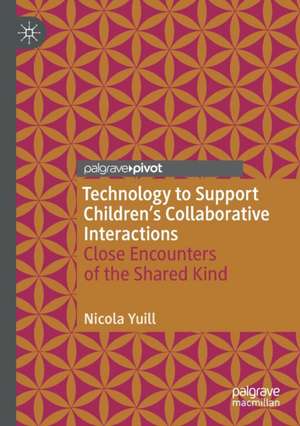Technology to Support Children's Collaborative Interactions: Close Encounters of the Shared Kind
Autor Nicola Yuillen Limba Engleză Paperback – 8 sep 2022
This book explores how technology can foster interaction between children and their peers, teachers and other adults. It presents the Co-EnACT framework to explain how technology can support children to collaborate, so helping them to learn and engage enjoyably with the world, in both work and play. The focus is on children, rather than young people, but the principles of supporting interaction apply throughout all life stages. Chapters on classrooms and on autism explain principles behind using technology in ways that support, rather than obstruct, social interaction in diverse populations. Collaborative interaction involves both verbal and non-verbal behaviour and this book presents evidence from closely analysing children’s behaviour in natural settings. Examples from cutting-edge technology illustrate principles applicable to more widely-available technology.
The book will be of interest to psychologists, educators, researchers in Human–Computer Interaction (HCI), particularly those designing with children in mind, and practitioners working with children who want to deepen their understanding of using technology for collaboration.
The book will be of interest to psychologists, educators, researchers in Human–Computer Interaction (HCI), particularly those designing with children in mind, and practitioners working with children who want to deepen their understanding of using technology for collaboration.
| Toate formatele și edițiile | Preț | Express |
|---|---|---|
| Paperback (1) | 445.88 lei 6-8 săpt. | |
| Springer International Publishing – 8 sep 2022 | 445.88 lei 6-8 săpt. | |
| Hardback (1) | 451.26 lei 6-8 săpt. | |
| Springer International Publishing – 7 sep 2021 | 451.26 lei 6-8 săpt. |
Preț: 445.88 lei
Nou
Puncte Express: 669
Preț estimativ în valută:
85.32€ • 91.24$ • 71.14£
85.32€ • 91.24$ • 71.14£
Carte tipărită la comandă
Livrare economică 18 aprilie-02 mai
Preluare comenzi: 021 569.72.76
Specificații
ISBN-13: 9783030750497
ISBN-10: 3030750493
Pagini: 137
Ilustrații: XVIII, 137 p. 17 illus., 13 illus. in color.
Dimensiuni: 148 x 210 mm
Greutate: 0.21 kg
Ediția:1st ed. 2021
Editura: Springer International Publishing
Colecția Palgrave Pivot
Locul publicării:Cham, Switzerland
ISBN-10: 3030750493
Pagini: 137
Ilustrații: XVIII, 137 p. 17 illus., 13 illus. in color.
Dimensiuni: 148 x 210 mm
Greutate: 0.21 kg
Ediția:1st ed. 2021
Editura: Springer International Publishing
Colecția Palgrave Pivot
Locul publicării:Cham, Switzerland
Cuprins
Chapter 1: The collaboration framework.- Chapter 2: Engagement and Joint Attention.- Chapter 3: Contingency and Control.- Chapter 4: Shared Understanding.- Chapter 5: Education: Technology orchestration in the classroom.- Chapter 6: Autism and technology for collaboration.
Notă biografică
Nicola Yuill is Professor of Developmental Psychology and director of the Children & Technology Lab (ChatLab) in the School of Psychology, University of Sussex, UK. She is co-director of the Autism Community Research Network Sussex (ACoRNS) and has published research into the topics of children’s collaboration through technology, children’s social cognition, autism and technology, social behaviour and children’s text comprehension.
Textul de pe ultima copertă
“Nicola Yuill writes with clarity and expertise, pulling together knowledge from psychology, Human-Computer Interaction and practical work with children. This book is essential reading for anyone seeking to understand digital technology as a tool for children’s interaction.”
—Dr Rosalind Merrick, Speech and Language Therapist
—Dr Rosalind Merrick, Speech and Language Therapist
This book explores how technology can foster interaction between children and their peers, teachers and other adults. It covers in particular how technology can support children collaborate, so helping them to learn and engage positively with the world, in both work and play. It focuses on children, rather than young people, though the principles of supporting interaction mostly apply throughout all life stages. Chapters on classrooms and on autism explain principles behind using technology in ways that support, rather than obstruct, social interaction in diverse populations. Collaborative interaction involves both verbal and non-verbal behaviour and this book presents evidence from closely analysing children’s behaviour in natural settings. Examples from cutting-edge technology illustrate principles applying to more widely-available technology.
The book will be of interest to psychologists, educators, those involved in Human–Computer Interaction (HCI), particularly those designing with children in mind, and many different practitioners working with children, who want to deepen their understanding of using technology for collaboration.
Nicola Yuill is Professor of Developmental Psychology and director of the Children & Technology Lab (ChatLab) in the School of Psychology, University of Sussex, UK. She is co-director of the Autism Community Research Network Sussex (ACoRNS) and has published research into the topics of children’s collaboration through technology, children’s social cognition, autism and technology, social behaviour and children’s text comprehension.
Caracteristici
Examines how technology might support collaboration as part of a developmental process conducive to well-attuned social interaction Demonstrates that by understanding small moments of interaction we can better understand how they come together into successful collaboration through technology Reveals how the experiences of children with autism can help us in framing questions about technology and social interaction
